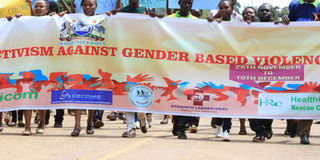Address fears of sexual violence against women as elections near

Kisii University students and other activists against gender-based violence march in Kisii town on November 29, 2016 to sensitise residents. Women should be protected against sexual violence. PHOTO | BENSON MOMANYI | NATION MEDIA GROUP
What you need to know:
- Even after the elections, many women have been left with scores of injuries, with some raped and young girls defiled.
- African women deserve to make their reproductive choices without interference from US foreign policy.
As the country gears up for the August 8 General Election, many women and girls are living in fear over their safety.
Politicians and some top government officials are already on the election campaign trail, telling the public about everything except what measures are being taken to protect and assist the marginalised, especially women and girls, to get assistance in case of election-related sexual violence.
Their apprehension is not misplaced, considering the history of a cycle of violence during party primaries, campaigns, and on the polling day.
Even after the elections, many women have been left with scores of injuries, with some raped and young girls defiled.
Even before the Independent Electoral and Boundaries Commission blows the whistle for the campaigns to begin, several women aspirants have been threatened verbally or physically by their male rivals and their hired goons.
This is not a good omen and the authorities must not only speak out, but also stamp it out.
In Kisumu County, the home of Ms Ruth Odinga, the Deputy Governor, who is eying her boss’s seat, was recently raided and electronic appliances stolen while she was away.
In Bomet, Sotik MP Joyce Laboso, who has declared her interest in the governor’s seat, has had several rallies disrupted.
In Embu, Runyenjes MP Cecily Mbarire was forced to snatch a microphone from a rival for the governor’s seat at a church function when his supporters heckled her.
WOMEN'S RIGHTS
She faced another hostile crowd at a rally where she was booed and not allowed to speak.
Indeed, these are just but a few examples of the political shenanigans going on behind the scenes for the female aspirants.
Unfortunately, most cases of rape and defilement are not reported in the media or to the authorities by victims for fear of embarrassment, humiliation, victimisation and intimidation.
The worst mayhem happened after the 2007 General Election, in which more than 1,300 people were killed and 300,000 displaced, a majority of them women and children, many of whom were also sexually molested.
The security organs and medical workers must be supported to provide health services to the victims.
These are some of the issues that were discussed during the recent African leaders’ summit in Addis Ababa on legal abortion.
The participants resolved to de-criminalise abortion and to ensure that every woman has a right to make a decision about her body, health and future.
The conference also pledged to strengthen the respective governments’ and inter-government institutions’ capacity to promote and protect women’s rights to safe and legal abortion.
Indeed, the importance of the Addis summit cannot be gainsaid, particularly now that the global Gag Rule will restrict organisations receiving United States global health funding from using even their own funds to offer counselling, advocating or provide safe abortion.
President Donald Trump’s executive order is threatening to put women’s health and lives at risk by limiting access to reproductive health care services, including safe abortion.
RETROGRESSING
African women deserve to make their reproductive choices without interference from US foreign policy.
The gag rule, which has been opposed by local and international civil rights groups and leaders, withholds USAid funding to any family planning organisation that provides or merely offers information about abortion.
The campaign against HIV and Aids, cervical cancer and Zika is likely to suffer.
Indeed, the debate was aptly summarised by IPAS Africa Alliance director Liza Muringo Kimbo in Addis.
She said: “This is the time for our governments to uphold their obligations to improve women’s health by providing comprehensive sexual and reproductive health care without jeopardising women’s health and lives.”
Mr Orlale is a communication and media consultant. [email protected]




